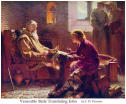Reverence
If the Bible is indeed God's Word to us, this means that we should approach it in the same way as we approach God himself - with exuberant joy, and yet also with due reverence (see Psalm 95:1-7). As we have already seen with the ark of the covenant, since God has revealed himself as holy, anything that has to do with him, whether a person, animal or property, is also holy (see, for example, Leviticus 27:28-29). This is why the apostle Paul, writing to the Romans refers to the Holy Scriptures (Romans 1:1-2 (NIV)). This will not mean that we shall idolise the Bible, simply that we will treat it with the respect it properly deserves. (God has, of course, also revealed himself as having many other characteristics - or attributes, as they are called - the most important of which is love - but holiness was, and remains, a fundamental attribute of God.)
Gypsies, we are told, will never place their Bibles on the ground, because they believe the Bible is a holy book. Some of us who are not gypsies may feel that this is taking things a little too far, but we surely cannot argue with the reason for their action. Although we may say that it is what the Bible contains that is holy, rather than the printed book (or cassette tape, or CD-rom), nevertheless, if the way we treat our physical Bible is a reflection of our attitude towards its contents, then we shall handle it with every care and respect. And when we come to read it, we shall handle its contents in exactly the same way. We shall come to our Bible, not only with expectation, even excitement, but also with veneration and awe. In other words, we shall pay the most careful attention to what the Bible actually says, and want to bring our keenest mental faculties to bear upon it, even to the extent of discovering the exact meaning of individual words within their context, as our act of worship and devotion to God, whose Son, the Lord Jesus, said we were to love him not only with all our heart (our emotions), our soul (our will) and our strength (our body), but also with all our mind (our thinking and reasoning powers) (see Mark 12:29-30, and parallels in Matthew and Luke.)
Above all, our reverence for the Scriptures will mean that we shall approach our Bible-reading prayerfully. Before we start to read, we shall want to ask God for his help to understand what the passage before us says, what it meant for its first readers and, in particular, what it means for us today.
(This
three-stage process of reading Scripture is sometimes called the inductive method of Bible-reading, and is one that many have found helpful. We explain it in greater detail in our page, Help with Daily Bible Reading.)
Reverence for the Scriptures, arising out of our recognition that they are indeed the Word of God, is therefore the first and most important of the 3-R's of Bible reading. The latter two R's follow as a result.
Receptiveness
We need to approach the Bible in an amenable frame of mind - with a mind clear of prejudice or preconception about what God has to say on a subject, sensitive and responsive to his voice - which is very often a gentle whisper (see 1 Kings 19:12) easily drowned by the distractive noises around and within us. It is only in this way that we shall hear what God is saying to us through his Word, the Bible. This means that, if at all possible, we need to be somewhere quiet (though some find soft background music an aid to concentration), and preferably somewhere we can be alone, when we read our Bible. If this is difficult where we live or work, we may be able to find a church, a library, or a park where we can read quietly and without interruption. Those who live in the country may be able to find a tranquil corner in a field or wood, at least during the summer months, where they can meet with God and ponder his Word. This was Jesus' own custom (see Mark 1:35).
Again, if we are going to hear properly what God is saying to us through his Word, we need to be willing to listen so as to hear what is actually being said, and not what we think is being said, or what we should like to hear. This is as true of the written Word of God as of any human speaker.
Not only do we ideally need a quiet environment in which to read the Bible, we also need to be quiet within ourselves in order to receive what God has to say to us. This is something many people find difficult. However, we can claim and act upon God's promises of inward peace, such as are to be found in Isaiah 32:17 (NIV), Zephaniah 3:17 (NIV) and Matthew 11:28-30.
Of course, as we have already emphasised, this does not mean that the Bible is not a book worthy of serious study. On the contrary, for nearly 2,000 years some of the ablest men and women in Christendom have devoted their lives to pondering its pages, understanding its original languages, and researching its background, in order to interpret the Bible's more obscure references and allusions. And, in our own generation, we must be especially grateful to those scholars who have put the Bible into the language of our own day and age. In particular, we must not fail to mention those who work in other lands, often in conditions of extreme difficulty and danger, in order to express God's Word in other tongues, some of which have no written form before the translators begin their work.

To gain an insight into what the task of Bible translation involves, and for a global perspective on the progress of translation work, we recommend that you visit the United Bible Societies' and Wycliffe Bible Translators' websites. These may be accessed via our Links to Other Websites.
If you wish to gain an appreciation of the task of translation into a specific group of languages we suggest a visit the Swedish-based Institute for Bible Translation, which may also be accessed via our Links to Other Websites.
So the second of our 3-R's of Bible-reading is receptiveness, and this is closely related to our third R - reflectiveness.
Reflectiveness
The Bible is not always an easy book to understand at a first (or even a second or third!) reading, and sometimes we shall find that we need to think about a passage, a verse, or even a single phrase, for some considerable time before we can really say we have got the hang of what it means. In this respect, reading the Bible can be rather like a cow chewing the cud! But we shall find that those parts we have to chew over the longest often become the most meaningful for us.
The Bible yields up its greatest treasures to those who are willing to spend time and effort on it, and who persevere until God makes his meaning clear to them. This is why many experienced Bible readers like to take a short passage and meditate upon it, turning it over and over in their mind until they have discovered its full meaning for them.
(Meditation on Scripture is an aspect of Bible-reading we explore in greater depth in the later page, Biblical Meditation.)
(Visitors from God's Secret Plan return to Main Text)
Although in one sense the Bible is a book like any other, in that it consists of paper with printed information which we may read and understand by the use of our natural mental faculties, yet in another most important sense the Bible is a book completely unlike any other. For, although we need to apply our best intellectual capabilities to our Bible-reading, nevertheless, the Bible is not like an academic textbook, to be read in a cold, analytical fashion. Rather, the Bible is a spiritual book, which yields up its spiritual truths only to spiritual people.
To understand better what this means, read 1 Corinthians 2:11-16. The idea behind what the apostle Paul writes here is that only those who are, as it were, on God's wavelength can really understand what God is saying.
This is why Jesus
so often taught in parables. After he had told the parable of the Sower, his disciples asked him why he always used this form of teaching. Jesus replied by quoting from the prophet Isaiah that, You will hear my words, but you will not understand; you will see what I do, but you will not perceive its meaning (Matthew 13:14, quoting Isaiah 6:9). As Jesus goes on to explain, it was because the people's hearts were hardened, their ears deaf, and their eyes closed towards God that they were unable to understand what he was saying to them (Matthew 13:15, quoting Isaiah 6:10).
The point at issue is, therefore, Are we really tuned-in to hear from God? Have we allowed him to open our ears so we can hear what he is saying to us through his Word? And, along with this, have we allowed him to open the inner eyes of our hearts (Ephesians 1:18 (NIV)) so that we can understand what he is saying to us? And, above all, are our hearts ready to receive the good seed of the Word and to allow it to produce an abundant harvest of righteousness (right living) in our lives? (see Matthew 13:23 and Galatians 5:22-23). For, as we have already mentioned, we not only need to hear what God said to his people thousands of years ago when the Scriptures were first written, but, even more importantly, we need to understand and act upon what God is saying to us through his Word today. The apostle James gives a vivid picture of the futility of not allowing our Bible-reading to influence the way we live - it's as silly as looking at yourself in a mirror but doing nothing to improve your appearance, and then going away and forgetting what you look like (James 1:22-25).
Two things will help us tune-in to God and transform our personal Bible-reading from an irksome duty into a delight:
-
Realising that we do not have to do it all on our own

Just as God took the initiative in the matter of our salvation by sending the Lord Jesus Christ to die for us before ever we realised the predicament in which our sins placed us (see Romans 5:6-11), so too, God does not leave us on our own in trying to understand the Bible, but his Holy Spirit helps us. Indeed, some have called the Holy Spirit the Divine Interpreter so vital is his work in helping us understand God's Word (see 1 John 2:27).
Does this come as a surprise? In the light of what we have read above, it shouldn't, for underlying the point that both the apostle Paul and the Lord Jesus Christ were at pains to put across in the passages to which we referred, is the crucial fact that God's truth is not received intellectually, but spiritually, that is to say, only how and when God chooses to reveal it. To understand this more clearly you may like to refer to John 14:15-17 and 16:13-15.
And then, secondly:
- Realising that the Bible is God's Living Word
 The story is told that, when Charles Spurgeon, the great Baptist preacher, spoke in the open air, in order to attract a crowd he would put a hat on the ground as if there was a small animal under it. Pointing to the hat, he would shout, It's alive! It's alive! When a large enough crowd had gathered, he would satisfy their curiosity by picking up the hat and uncovering not an animal, but a Bible. Picking up the Bible, he would wave it in the air and repeat, It's alive!. Then he would start to preach.
The story is told that, when Charles Spurgeon, the great Baptist preacher, spoke in the open air, in order to attract a crowd he would put a hat on the ground as if there was a small animal under it. Pointing to the hat, he would shout, It's alive! It's alive! When a large enough crowd had gathered, he would satisfy their curiosity by picking up the hat and uncovering not an animal, but a Bible. Picking up the Bible, he would wave it in the air and repeat, It's alive!. Then he would start to preach.
We may be inclined to dismiss such a device as something of a gimmick, but what Spurgeon said was perfectly true (and by all accounts, it worked!). The Bible is alive - it is a living Word, as we have already seen from Hebrews 4:12. If we will only allow it to do so, God's Word will show us beyond all possible doubt that it has an intrinsic dynamic of its own, a unique capacity to penetrate to the very heart of every matter it addresses.

In Luke 10:38-42 we are introduced to two sisters, Mary and Martha. Like many sisters, they offer a striking contrast in personalities. Martha was the practical one, always feverishly busy with everyday things. Mary, on the other hand, was more contemplative. So, when Jesus visits them, Mary is quite content to sit at his feet, drinking in all he has to say, apparently oblivious of Martha's bustling activity and anxiety for their guest's welfare. When Martha comes to Jesus and complains how unfair Mary is being by not taking her share of the preparations for their meal, Jesus replies that she has discovered the one thing that is really worth being concerned about - listening to the Lord's words.
We believe this touching incident is especially relevant for us who live in the pressurised world of the 21st century. Are we, like Martha, simply too busy to stop and listen to what the Lord has to say to us through his Word? Or are we, like Mary, willing to put everything else aside so that we may listen to the Lord in order to drink in what the apostle Peter describes as pure spiritual milk - that nourishment for our souls to be found only in the Word of God (1 Peter 2:2-3)?
This does not mean, of course, that we shall neglect the many practical matters that properly concern us all. (The apostle Paul had some hard words for the Thessalonian Christians who were evading doing a proper day's work (2 Thessalonians 3:6-12). However, it does mean that we shall seek to order our lives in such a way that we give proper priority to the spiritual disciplines, including Bible-reading. Unless we do so, our lives will be sadly impoverished, however much we try to make up for it in other ways. In Matthew 11:12 Jesus speaks of the Kingdom of Heaven advancing forcefully, and we need to be equally forceful in securing a proper place for Bible-reading in our daily schedule.
 Once we have affirmed, in faith, that the Bible is the Word of God we shall want to know how to gain the greatest benefit from our Bible-reading.
Once we have affirmed, in faith, that the Bible is the Word of God we shall want to know how to gain the greatest benefit from our Bible-reading.



 The story is told that, when Charles Spurgeon, the great Baptist preacher, spoke in the open air, in order to attract a crowd he would put a hat on the ground as if there was a small animal under it. Pointing to the hat, he would shout, It's alive! It's alive! When a large enough crowd had gathered, he would satisfy their curiosity by picking up the hat and uncovering not an animal, but a Bible. Picking up the Bible, he would wave it in the air and repeat, It's alive!. Then he would start to preach.
The story is told that, when Charles Spurgeon, the great Baptist preacher, spoke in the open air, in order to attract a crowd he would put a hat on the ground as if there was a small animal under it. Pointing to the hat, he would shout, It's alive! It's alive! When a large enough crowd had gathered, he would satisfy their curiosity by picking up the hat and uncovering not an animal, but a Bible. Picking up the Bible, he would wave it in the air and repeat, It's alive!. Then he would start to preach.